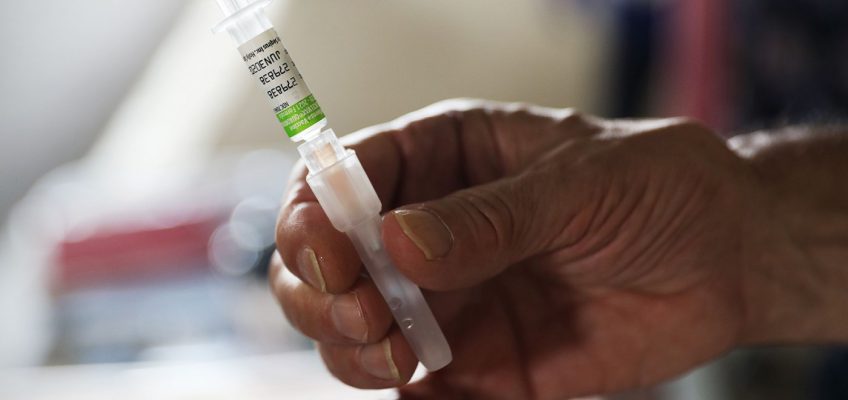Jessie Hellmann | (TNS) CQ-Roll Call
Community health centers and organizations that primarily serve low-income people are being disproportionately hurt by the biggest hack in health care history, which has disrupted payments for thousands of health care providers for a month now.
The hack, which crippled Change Healthcare, the clearinghouse for 30% of medical claims in the United States, has forced providers to find alternative funding sources to stay afloat. For large providers, like many health care systems, that comes in the form of reserves set aside for emergencies.
But for smaller providers, like many community health centers, that can mean taking out lines of credit, which can come with large interest rates, missing payments to vendors and seeking a hodgepodge of support from insurers that are willing to front payments.
“It’s been very tough for us,” said Robert Hilliard Jr., chief executive officer of Legacy Community Health, based in Houston.
Legacy, which has 57 clinics across Texas, processes about half of its claims through Change Healthcare. It currently has about eight figures in unpaid claims waiting to be processed, he said.
“We’ve had to extend a line of credit with a bank because we’ve had no funds” and negotiate with vendors on missed payments, Hilliard said.
The debate surrounding the Change Healthcare hack has largely been dominated by the impact on large health care systems, which move billions of dollars a day in claims. Americans spent $1.4 trillion on hospital care in 2022.
But in many cases, hospitals have more resources to weather emergencies like this. An analysis by KFF of 274 nonprofit hospitals and health systems found an average of 218 days’ cash on hand.
Fewer resources
But that’s not the case for many community health centers, which primarily see Medicaid patients, rely on grants and have thin operating margins. The national average of cash on hand for health centers in 2016 was 64 days, according to the latest data available.
UnitedHealth Group, which owns Change Healthcare, began testing systems this week for submitting claims. But the timeline for when it will be fully operational again is unclear. And processing claims that have been sitting around for a month will take time.
“I do worry that as big health care organizations come back online that people will stop caring as much about the impact on everybody who is left,” said Julia Skapik, medical director for informatics at the National Association of Community Health Centers.
While the Biden administration this week asked insurers to target advance payments to small, rural and safety-net health care providers facing cash flow issues, Skapik said that directive should have come earlier.
The federal government has been criticized for its slow response to the attack. While it has allowed providers to submit requests for advance Medicare fee-for-service payments, it can only encourage the private industry to do the same. That includes Medicare Advantage plans, which cover half of Medicare beneficiaries, and Medicaid Managed Care plans, which cover about 90% of Medicaid beneficiaries.
It’s not yet clear how successful the government’s request has been. Aside from UnitedHealth Group, which said it has directed $2 billion to providers, insurers have not publicly released information about how much financial assistance they have sent out.
Alliance of Community Health Plans, Association for Community Affiliated Plans, America’s Health Insurance Plans and Blue Cross Blue Shield Association wrote in a letter to Biden administration officials this week that they commit to “providing targeted advance payments to impacted providers in need.” They also wrote that they will engage in “proactive and data-driven outreach” to remaining providers facing operational challenges with claims processing or reimbursement and support providers switching to alternative services.
Blue Cross Blue Shield also told CQ Roll Call it is advancing payments to in-network providers.
In a separate letter, Medicaid Health Plans of America, which represents Medicaid managed care plans, also said its members are “committed to making targeted advance payments.” But those payments will need to be repaid and are only intended to make up for unpaid claims, not to cover costs associated with the fallout from the hack, like interest charges associated with taking out loans.
“There’s been no effort to talk about how to relieve us from those costs,” Hilliard said.
Unpaid claims
Providers have also said while they appreciate the assistance, the amount being offered is small compared with how much they are experiencing in unpaid claims.
Hilliard said UnitedHealth Group has offered money, and while it came quickly, it is less than 10% of what is being held up in claims right now.
Peggy Anderson, president and CEO of Third Street Family Health Services, based in Mansfield, Ohio, said revenue dropped from an average of $650,000 per week to $180,000 per week.
“That’s a pretty significant loss for us not knowing when things will be up and running again,” she said.
Third Street Family Health Services was able to get approved for $100,000 in assistance from Optum, $80,000 of which has come through so far. The center has been able to use some of its cash on hand and took out a line of credit.
“While the $100,000 is wonderful, we’re close to a million dollars now that’s just sitting there, and that’s revenue that we fully anticipated getting in,” Anderson said. She hopes policymakers recognize the need for a “safety net” system that can back up critical health care providers when emergencies like this happen in the future.
Some providers have had more luck.
Berinna Doggett, executive vice president of health care and community resources for So Others Might Eat, which has two health care clinics in Washington, D.C., said they have switched clearinghouses and received checks from Medicaid managed care plans over the past few weeks.
The problem occurs if insurers haven’t switched clearinghouses. Also, the process can move slowly.
“It’s minimal. It’s nowhere where we were,” Doggett said.
___


Leave a Reply